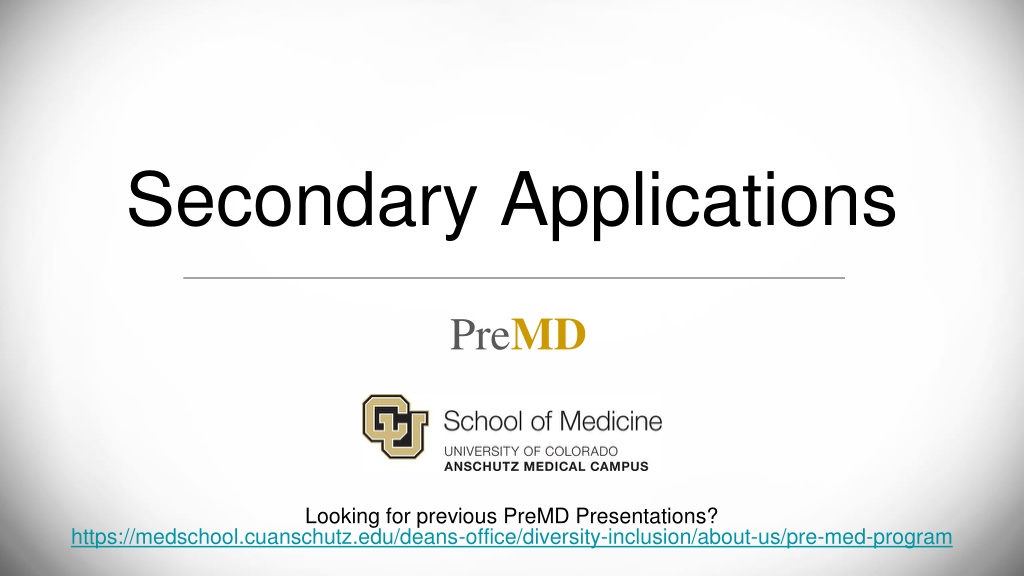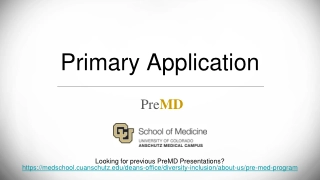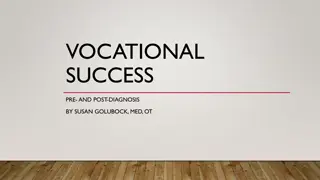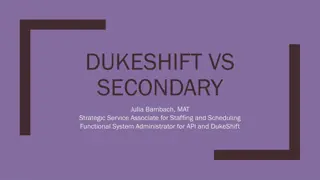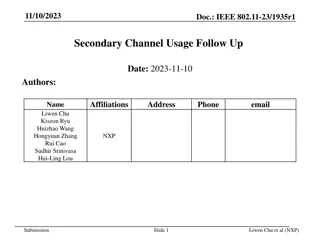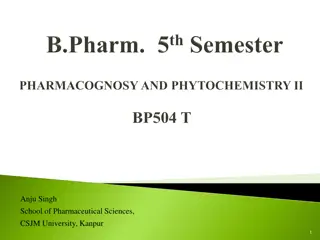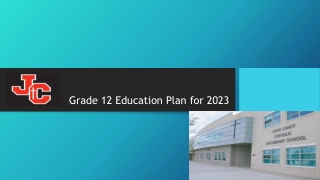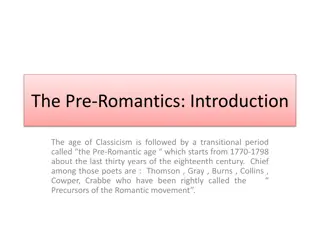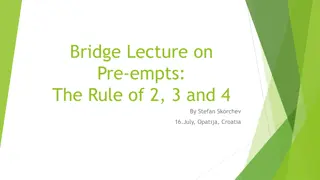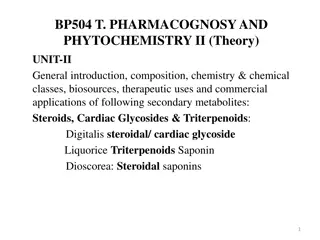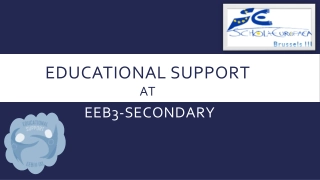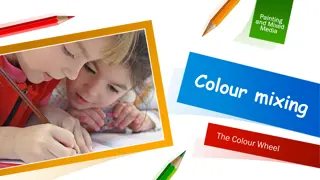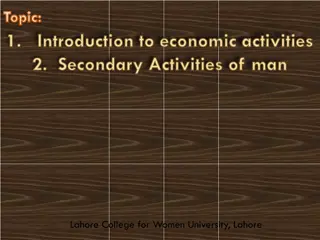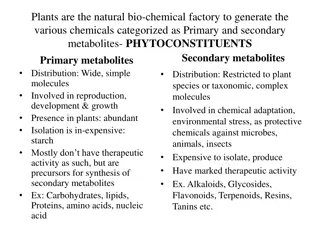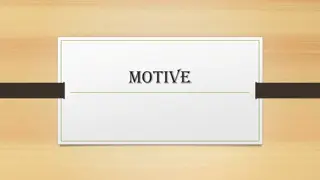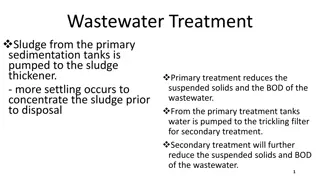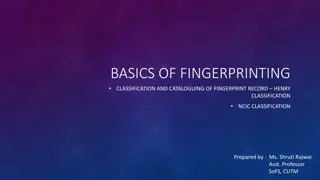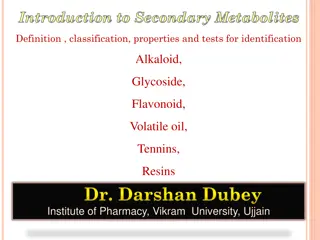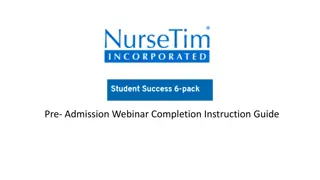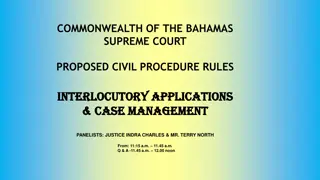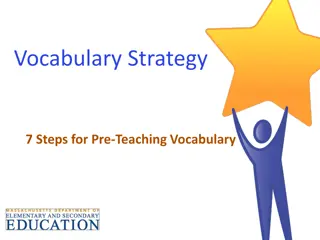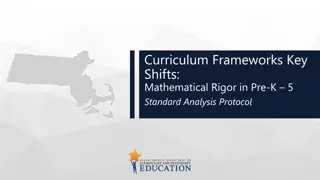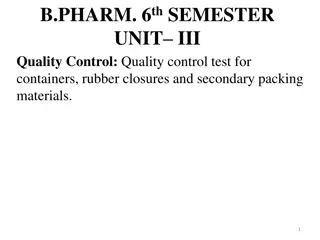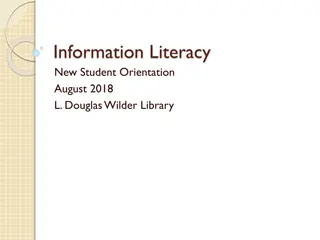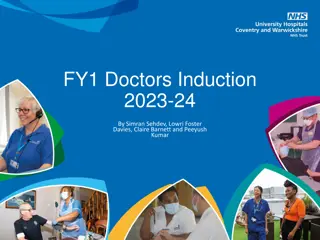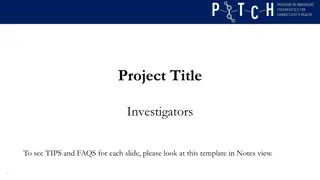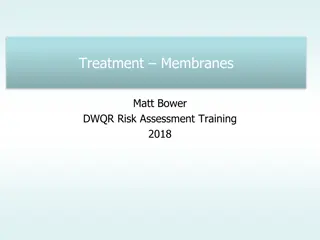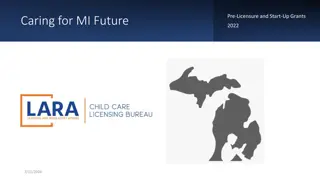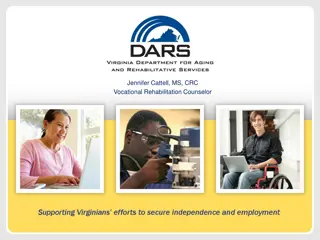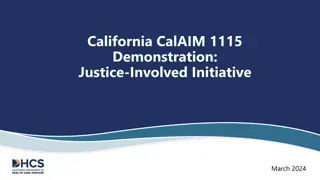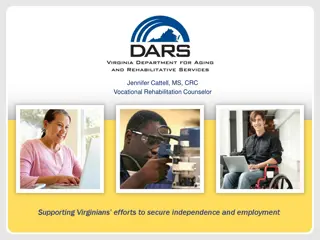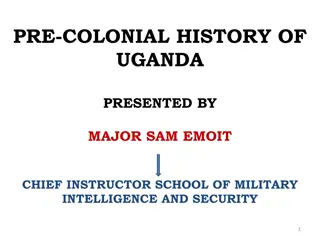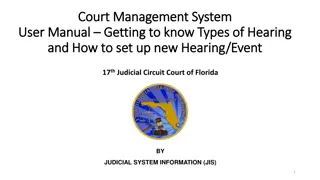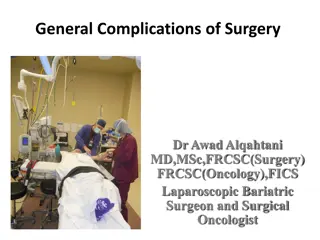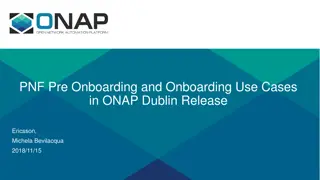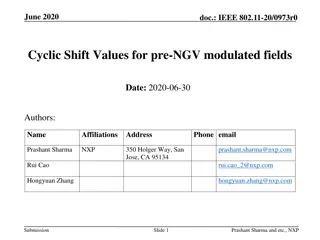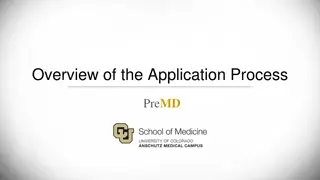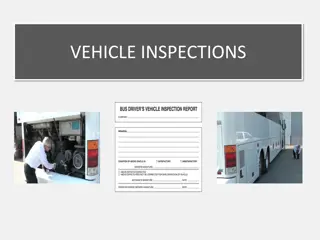Comprehensive Guide to Pre-Med Secondary Applications
This comprehensive guide provides valuable information on Pre-Med secondary applications, including what they entail, timelines, costs, and effective approaches to tackling them. It also highlights the importance of pre-writing common prompts and offers insights into navigating the application process smoothly.
Download Presentation

Please find below an Image/Link to download the presentation.
The content on the website is provided AS IS for your information and personal use only. It may not be sold, licensed, or shared on other websites without obtaining consent from the author. Download presentation by click this link. If you encounter any issues during the download, it is possible that the publisher has removed the file from their server.
E N D
Presentation Transcript
Secondary Applications PreMD Looking for previous PreMD Presentations? https://medschool.cuanschutz.edu/deans-office/diversity-inclusion/about-us/pre-med-program
PreMD Entry Survey Please complete our survey! You will be entered into a raffle for an AAMC question pack! This includes all 6 question banks for all the subjects with a total of 720 questions!
The Application Cycle MCAT Interviews Primary App Secondary Apps Judgement Tests
What is a Secondary? A set of essays that you write for a specific school That school s way of getting to know you better before a potential interview Each school chooses which prompts they want to ask you and you answer them in essay format Some prompts are commonly asked so many students will pre-write them Other prompts are more unique to specific schools Schools can also change which prompts they ask from year-to-year, BUT they typically stay the same Secondary/Situational Judgement Tests Interviews Primary
Timeline They are sent to you after your primary application is cleared by the school Secondary apps can be sent back immediately after your primary is approved or some primary apps will go through a more thorough review process and may take a few weeks to get to you Start writing them in July and continue writing them through the end of September Pre-write the common prompts to help with writing burden
Cost of Applying Step Description Primary Application $170 for first school, $43 for each additional school Secondary Application Varies from $50-$150 Interview Travel Varies widely Total Expect total costs to be in the $1,000 s - AAMC s Fee Assistance Program - Help with MCAT prep materials, MCAT fee, AMCAS fee, Secondary Application fees Ask Pre-med advisor for other avenues to save money -
How can I find the prompts? Prospective Doctor Medical School Headquarters Library of prompts for each school BeMo Academic Counseling Library of prompts for each school Student Doctor Network School specific forums Some schools post their secondaries on their website
How do I finish them all on time? Prewrite your responses ahead of time using prompts from past years or those posted on the school website Be prepared to have to rework the same response into a few different versions due to word-count / character restrictions Research the school s medical school website and social media to better understand their values and why you would be a good fit Keep a spreadsheet of secondary invites you ve received, and mark once you have submitted them A good goal for secondary responses is 2 weeks from receiving the invite Try to complete secondaries on a rolling basis, you can prioritize which secondaries matter more to you
What do I write about? Ensure you are answering the question they asked you Elaborate on any experiences/activities that you didn't get a chance to share details about in your primary application Answer what makes you unique as a candidate to their specific program Show; don't tell. Best to follow the format: proof -> claim. Use your journal to inspire stories that exemplify traits you claim you have or wish to show. E.g. I work at a group-home and recently two residents had a violent altercation. My duty as a care aid was to step in and prevent the situation from escalating further. I resolved the situation and no one was seriously hurt. Through these types of experiences I am well-equipped to handle high-pressure and stressful situations. Be authentic to who you are Try to think of examples or experiences that set you apart and show how you might possess unique qualities that would make you a better medical student than other people applying
Strategy to templating responses to common prompts Pre-write about some of the memorable experiences you ve had throughout college and gap years. Once secondary prompts are given by each school, tailor/edit those stories to fit the prompts. See if you can find mission/vision statements from the school, or other displays of values on their website/media/etc and use these to guide your responses to show what makes you a good fit for that specific program. You could have a few sentences in each common prompt that can be swapped out to be more specific to each program. Keep a document of all your secondary responses - you will be able to reuse many responses with slight modifications since many prompts from different programs will be very similar. SUPER helpful Reddit post about how to pre-write your secondaries
Example Prompts (bolded are more common questions) Most prompts are either 2000 characters or 200-250 words limit. What else do you feel is important for us to know about you? Please use this space to highlight something not addressed in your application, including new experiences not in your AMCAS application. If you are a recent graduate, please tell us what you have been doing since graduation. You may answer "Not applicable". If you have taken a gap year(s), please explain what you have been, or will be, doing since graduating from your undergrad institution. Is becoming a physician a second career for you? If so, what was your first career choice? Indicate any special experiences, unusual factors or other information you feel would be helpful in evaluating you, including, but not limited to, education, employment, extracurricular activities, prevailing over adversity. Explain why you decided to apply to _________ School of Medicine. Write a short statement describing how you envision using your medical education to advance care for under- represented or marginalized populations. Tell us about a challenging problem you faced and how you resolved it. This is a culturally diverse and talented community. How would you enrich/enliven this community? The essay should discuss material that is not included in the rest of your application.
Why Our School - What to Write About Probably the most common secondary prompt Important to research the school and find specific programs, philosophies, curriculum specifics, clubs, etc. that you can relate to and use Employ the show then tell approach E.g. Before medical school I worked as a scribe in an endocrinology clinic and saw the impacts of diabetes on our population s youth. As a medical student at CU I plan to get involved with research at CU s Barbara Davis Center for Diabetes to Anything like this. Relate your experiences/values to something specific about a school or its mission to prove that you really want to go there. This is a good prompt to create a template for and switch out XYZ elements for different schools
Diversity Prompt - What to Write About Can be anything that makes you unique! Cultural background Academic background Hobbies Personality traits Whatever it is, relate it back to how it s going to help you excel in medical school, be a stellar physician, and how your perspective and experiences are going to contribute to your teams How will your experiences help you become a unique medical student/future physician
Adversity - What to Write About Write about any particularly important challenge you ve faced or failure you ve experienced Discuss what you learned from this experience and how it s shaped you into who you are today Don t focus on external factors being the cause of the adversity you faced Extremely important to identify specific areas of growth and personal development that resulted from your challenges, own the challenge Relate it to how it s going to make you a better medical student, physician, person, teammate, etc. If you have something monumental, use it. If not, that s totally fine. Again, the most important thing is that you show your growth as a person and future doctor
What Makes it Good? Brevity and Clarity: Is concise and straightforward, and makes points quickly without embellishment Personalization: Shares unique experiences, skills, and perspectives in alignment with program values Relevance: Actually answers the specific questions! Demonstrate Diversity & Humanism: Shares how your background, experiences, skills, and capabilities can contribute to the medical school community and ultimately, your patients Attention to Detail: Ensures no spelling and grammatical errors Honesty and Integrity: Is straightforward and truthful in responses. Doesn't try to exaggerate or fake anything. Remember, the main goal of your application is to show who you are and why you are an ideal candidate for medical school.
Editing? 1. Write multiple drafts, similar to your personal statement 2. Find a trusted mentor or friend to help edit your responses 3. Read it out loud
Tips Start early: allow enough time to complete all applications and ensure you submit them by the deadline Plan your time: create a realistic timeline and schedule that allows you to work on your applications while also meeting your other school or work obligations Be organized: keep track of deadlines and make sure you have met all the necessary character limits Showcase personality: show what makes you unique, your motivation for becoming a physician, and your accomplishments Use proper grammar and spelling: proofread everything multiple times and consider having someone else review your applications before submitting Be honest: don't embellish your experiences or accomplishments to make yourself look better Show your potential: highlight your unique strengths, such as problem-solving skills, leadership abilities, and teamwork Be yourself: convey your authentic self and let your application reflect your passion for medicine and your desire to make a difference in people's lives, specifically as a physician
Dos and Donts Do Have a trusted friend/mentor review your responses Use this as an opportunity to determine which programs you truly want to continue to apply at / interview with (almost every program will give you a secondary, and each one costs $$$) Demonstrate humanism! This is your space to show who you are and how you would excel in the art of medicine. Usually, reviewers will not see your metrics/grades when rating your secondary responses - you have often passed a certain cutoff at this point and are now showcasing who you are and how that sets you apart Be prepared - prewrite responses, do your due diligence on programs, and respond promptly Don t Mistakenly copy the wrong response into a question prompt or have grammatical errors! Use the same exact response to similar prompts at different programs - OR use the same examples/experiences in multiple answers to the same school - you should be tailoring your responses Write a different school s name in another school s essay When asked about challenges, own them and don t blame them on external factors Lie or exaggerate about anything you did - you may be asked details about your responses during interviews - if you say you speak another language, they may conduct the interview in that language
Situational Judgement Tests (CASPer, DUET, PREview) CASPer DUET PREview Situational judgment test (SJT) Value-alignment assessment Professional readiness exam Evaluates professionalism and non-cognitive skills Compares your values to what a program offers Assess knowledge of effective and ineffective professional behaviors
CASPer (Altus Suite) CASPer is an open-response, situational judgment test (SJT) that evaluates professionalism and non-cognitive skills, such as collaboration, problem solving, ethics, and empathy Format of the exam: CASPer includes 14 dilemmas or scenarios, followed by 2 questions, each with 5 minutes to respond. Think of CASPer as an automated set of multiple mini interviews. 9 video-based scenarios and 5 word-based scenarios 8 scenarios require typed responses; 2 are word-based and 6 are video-based 6 scenarios require video responses; 2 are word-based and 4 are video-based Sample Scenario and questions: Consider this statement: From time to time, we deal with conflict in some form. Describe a time when you had to deal with conflict and how you coped with it. How might you handle a similar situation differently should it arise again? What would be your strategy if you were faced with a conflict that was extremely difficult to resolve?
CASPer Continued Five minutes to respond isn t a lot of time so it is worthwhile to prepare for commonly asked scenarios/questions Take the full practice test available on the CASPer website ahead of your real test In your responses - briefly describe your actions and most importantly, discuss why you would choose those actions Example: You catch your classmate cheating on an exam. What do you do? I d have an open, honest, and nonjudgmental discussion with my classmate and elicit their perspective for why they cheated. It would be important for me to have this discussion with them so I could learn about their motivations and better understand their situation. Following this, I d discuss with them that they should go to the professor and be honest about what they ve done and why they ve done it. If they refused to turn themselves in, I d tell them that I d regrettably have to report it because their actions were unfair to the rest of the class. This test is essentially evaluating the same characteristics that will be evaluated for in MMI s, a format of interviews used by many medical schools (more on this at later sessions)
Duet (Altus Suite) A value-alignment assessment comparing your values to what a program offers For each group of characteristics, choose which is more important Your answers are then compared to the programs you ve applied to
AAMC PREview The AAMC PREview designed to assess examinees understanding of effective pre-professional behavior across eight core competencies for entering medical students professional readiness exam is The exam includes written scenario sets that present hypothetical dilemmas that you may encounter in medical school, which are linked to eight pre-professional competencies. They are set in educational, healthcare, or other real-life settings. The scenario sets are developed in collaboration with the medical school community. There is a full-length practice exam provided by AAMC
PreMD Exit Survey Please complete our survey! You will be entered into a raffle for an AAMC question pack! This includes all 6 question banks for all the subjects with a total of 720 questions!
Thank you! Questions?
